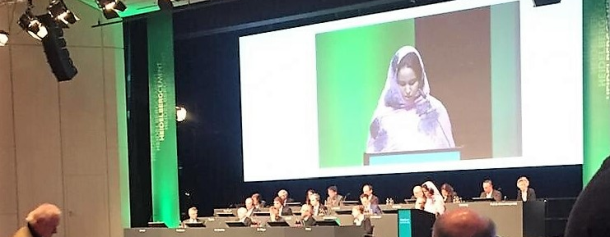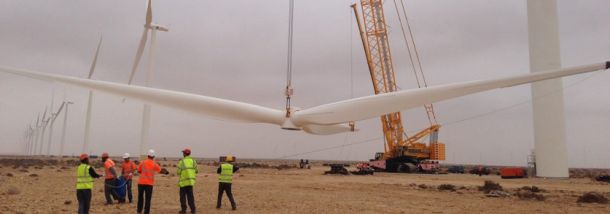
The German cement giant HeidelbergCement states that the company's operations in occupied Western Sahara are perfectly lawful according to a due diligence audit carried out by... HeidelbergCement.
The Board of Directors of HeidelbergCement has defended the company's operations in occupied Western Sahara as not violating international law, according to "a comprehensive human rights risk analysis" that it has carried out itself.
This was stated during HeidelbergCement's virtual Annual General Meeting on 4 June 2020, when the company management responded to questions and a countermotion presented by the German NGO Dachverband der Kritischen Aktionärinnen und Aktionäre in collaboration with Western Sahara Resource Watch (WSRW).
HeidelbergCement currently controls two cement factories in Western Sahara through its Moroccan subsidiary Ciments du Maroc. On one hand, it holds a majority stake in a cement grinding company in El Aaiún, the capital of Western Sahara. In May this year, it took over Cimenteries Marocaines du Sud (CIMSUD), also located in El Aaiún.
HeidelbergCement's Board furthermore cites local benefits to buttress its claim, while completely ignoring the Saharawi people's right to self-determination - a right backed by the International Court of Justice and the cornerstone principle guiding the UN peace process to resolve the conflict. In recent years, consecutive rulings of the Court of Justice of the European Union have nullified the application of EU-Morocco agreements in Western Sahara, because the Saharawi people had not granted their consent - a practical translation of self-determination. The question of benefits is as such irrelevant, the Court concluded in §106 of Case C‑104/16 P: what matters is that the people of Western Sahara have expressed their consent.
Despite having failed that clear legal requirement, rooted in the applicable principles of international law, HeidelbergCement states that it is convinced its actions are permissible, as "locals" profit. From what WSRW understands, the so-called 'audit' from the cement company has never been shared with any relevant Saharawi group, and it is not known whether Saharawi institutions have ever given its feedback to the terms of reference nor to the conclusion of the document.
WSRW has transcribed the full responses of the Board of HeidelbergCement. Find the German transcript here, and the English translation thereof here.
“By providing basic material for the construction of the infrastructure on occupied territory, HeidelbergCement directly supports the illegal annexation and settlement practices of Morocco, which the Research Service of the Bundestag has classified as a violation of the Fourth Geneva Convention and its First Additional Protocol”, the countermotion reads, referring to the analysis by the Bundestag research service that qualified Morocco as an occupying power.
“In addition to international humanitarian law, HeidelbergCement must also respect the European Court of Justice's assessment that Western Sahara is not part of Morocco”, the countermotion stated, adding that HeidelbergCement and its subsidiaries are to obtain the consent of the people of Western Sahara for its activities to be lawful.
Saharawis are today a minority in their own homeland, outnumbered at an estimated 3 to 1. Morocco violently invaded Western Sahara in 1975 – thereby willfully ignoring the UN Security Council and the International Court of Justice, which had concluded that Morocco had no sovereignty over Western Sahara and that the inhabitants of the territory, the Saharawi people, had a right to self-determination: the right to choose the status of their land. The brutal war that ensued resulted in many Saharawis fleeing their homeland, to set up refugee camps in the neighbouring Algerian desert. To date, they live there as refugees in harsh humanitarian conditions, separated from their kin by Morocco’s 2000+ kilometers militarily foritified wall that effectively divides Western Sahara. The UN treats Western Sahara as a Non-Self-Governing Territory with no administering power appointed to it. To date, no State has recognised Morocco’s claim to the land. Saharawis living in the part of Western Sahara that is occupied by Morocco are subjected to heinous human rights violations, as reported by Human Rights Watch and Amnesty International.
"The grinding plants near El Aaiun import clinker and gypsum from Morocco and buy additional raw materials from companies in Saharawi, i.e. local ownership, and the majority of the products, 65%, are sold in El Aaiún and the surrounding area, thus also benefiting the local population. The rest is then exported to Morocco. We therefore consider our activities on the ground to be compatible with international law", HeidelbergCement's Board stated at the AGM.
"We have come to the conclusion that the activities are in accordance with international law, that they do not violate it, and once again I would like to point out that we are working very hard to improve the economic conditions of the local population, that we use the raw materials on the ground as little as possible if this is not clarified, and in this respect it is true that we have 9% of the shares with local stakeholders, business partners, and that at the same time 50% of the employees are local colleagues", it told.
'We deserve an answer' from HeidelbergCement
When requesting answers on human rights from HeidelbergCement with regard to its operations in occupied Western Sahara, Saharawi Khadja Bedati was told that the company "deliberately makes social sponsoring of various sports clubs".
UK company building wind park in occupied Western Sahara
Morocco and Siemens press on with their plans to generate energy in the human rights black-spot that is Western Sahara: the first controversial wind farm near Boujdour is expected to be operational in December 2018, built by a UK company.
New controversial energy infrastructure to be built in Western Sahara
The Moroccan government has opened for a relatively large tender in Dakhla.
Report: Moroccan green energy used for plunder
At COP22, beware of what you read about Morocco’s renewable energy efforts. An increasing part of the projects take place in the occupied territory of Western Sahara and is used for mineral plunder, new WSRW report documents.



